This Medieval Pottage Stew is simply another name for a thick, rich, soup often made by Peasants during the Middle Ages. Since peasants were poor, and couldn't afford meat, they used whatever vegetables and grains they could grow to make this soup, often served with a dark, crusty loaf of bread.
So why the sudden look into Medieval eating habits?
Have you ever really thought about the Middle Ages? It's actually kind of ironic when you compare it to today.
The wealthy could afford all kinds of meat, anytime they wanted it, along with the finest wine, ale, a variety of cheeses, and even the lighter, tastier, loaves of wheat bread. And vegetables? They were considered peasant food, definitely not to be trusted.
Meanwhile, the lowly peasants scrounged for every last crumb they could find. They worked from sunup to sundown, burning around 4,000 calories a day, managing the king's land in exchange for a small plot to grow their own barley and rye. The wives and daughters managed the gardens and maybe a stray animal or two in hopes of a few eggs, or a little milk to make their own cheese.
Their diet was predominantly vegetarian with the majority of their calories coming from their dark, dense, loves of barley bread, or rye. There were no potatoes or tomatoes yet, so their main vegetable crops were turnips, parsnips, leeks, onions, and cabbage.
They would chop all these vegetables into a big cauldron and boil them in whatever broth they could make from stray bones and vegetable scraps. The stew would then be thickened by adding oats or barley, and spiced with whatever herbs grew in their garden.
This Medieval Pottage Stew, along with their bread would be their main meal, along with cheese if they could afford it.
And who do you think was healthier? The poor scrawny peasants? Or the rich and wealthy lords and kings?
You guessed it.
The wealthy are usually depicted in paintings and drawings as being OBESE. King Henry VIII was said to have been so large they needed a hoist just to get him on his horse. He suffered from gout, leg ulcers, diabetes, and weighed about 400lbs when he died at the ripe old age of 55.
The peasants predominantly lived on a HIGH CARB diet, while the wealthy predominantly lived on a HIGH PROTEIN, HIGH FAT diet.
Sound familiar?
Many of us today truly ARE eating like the Kings and Queens of old, and suffering the same diseases they did.
Take a note - eat like a peasant.
Medieval Pottage Stew
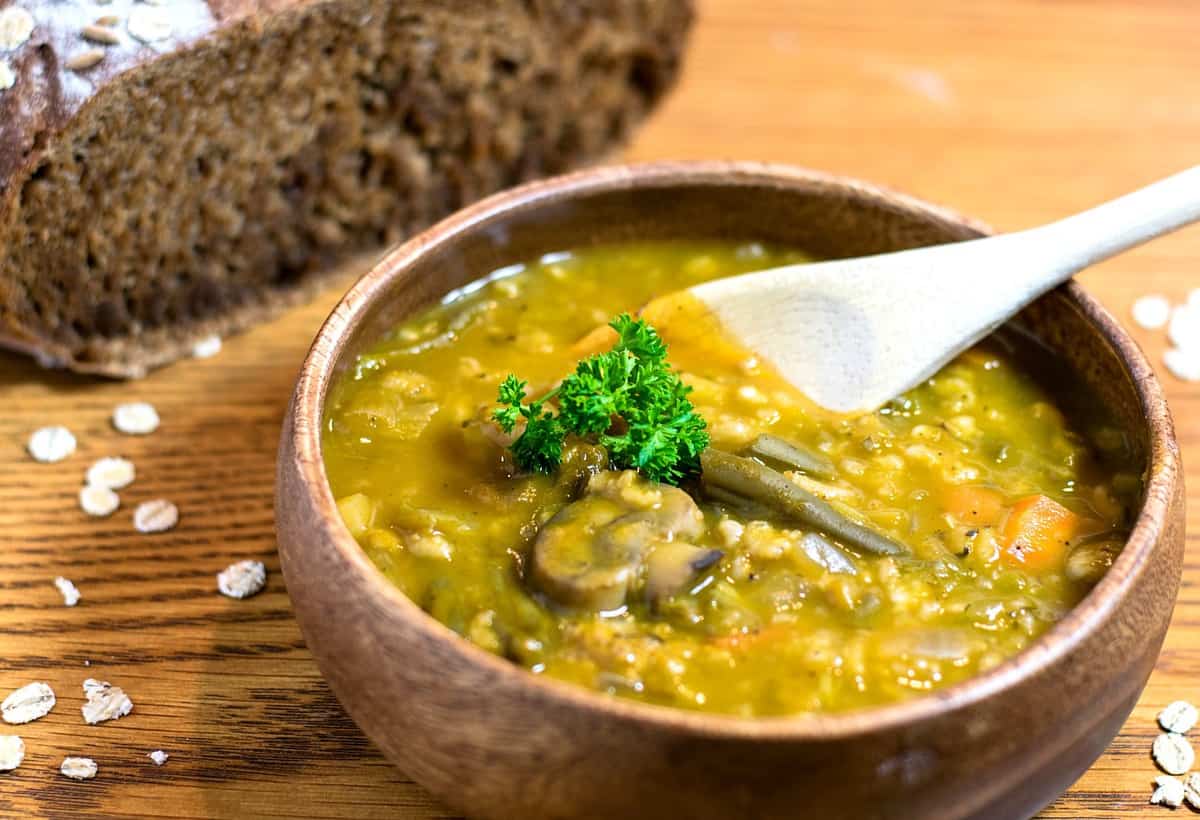
So with all that in mind, I wanted to try and recreate a typical meal that a Medieval Peasant might have made.
So get out your cauldron and let's get started.
- In a large stew pot, add 1 cup of diced carrots, 1 cup of diced parsnips, 1 cup of diced onion, and 1 cup of diced turnips.
- Sweat the veggies using about ¼ cup of low sodium veggie broth
- After 10-15 minutes, add 1 cup diced leeks, 1 cup sliced mushrooms, 1 cup fresh green beans (or use a 15oz can, rinsed and drained), and 1-2 cups of chopped cabbage (I used Napa).
- Let that simmer for a few minutes and then add 2 quarts of low sodium veggie broth.
- Season with 1 large bay leaf, ½ teaspoon dried thyme, ½ dried rosemary, ½ teaspoon rubbed sage, ½ ground pepper, and ¾ teaspoon salt.
- Stir in ½ cup of red wine. (it may or may not be true to what a peasant might use - but it does add a nice flavor)
- Bring the soup to a boil, and then lower the heat to LOW and cover.
- Let simmer for 30 minutes.
- Stir in 1 cup rolled oats (or use ½ cup rolled oats and ½ barley flakes - available at Whole Foods)
- Continue simmering for another 20-30 minutes, or until grains are cooked.
- Add any additional seasoning if desired, 1 Tbs of balsamic vinegar, and remove bay leaf before serving.
- Pairs well with a nice, crusty loaf of Rustic Bread.
I am still tweaking the Bread Recipe I used. I used a combination of Bread Flour, Whole Wheat Flour, Rye Flour, and Molasses and then sprinkled Barley Flakes and Rye Seeds on it before baking. It was';t bad, but the crumb still needs some work.
This stew is literally chok-FULL of the good stuff.
If you try it I'd love your honest opinion. This recipe DOES make a lot but I'm sure it can easily be frozen for later. Keep those comments coming and remember....
EAT LIKE A PEASANT !!

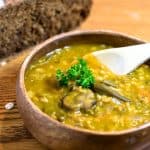
Medieval Pottage Stew
- Prep Time: 20 minutes
- Cook Time: 1 hour
- Total Time: 1 hour 20 minutes
- Yield: 12 1x
- Category: Soup/Stew
Description
This Medieval Pottage Stew is simply another name for a thick, rich, soup often made by Peasants during the Middle Ages, chock-full of vegetables and grains .
Ingredients
- 1 cup carrots (diced)
- 1 cup parsnips (diced)
- 1 cup onions (diced)
- 1 cup turnips (diced)
- 1 cup mushrooms (sliced)
- 1 cup leeks (diced)
- 1 cup cabbage (chopped)
- 1 cup green beans (chopped)
- 2 qts vegetable broth (low sodium)
- 1 bay leaf
- ½ tsp rubbed sage
- ½ tsp dried thyme
- ½ tsp dried rosemary
- ½ tsp black pepper
- ¾ tsp salt
- ½ cup red wine
- 1 Tbs balsamic vinegar
- ½ cup rolled oats
- ½ cup barley flakes
Instructions
- Peel and chop all vegetables
- Add carrots, parsnips, onions, and turnips to a large stew pot with about ¼ cup veg broth
- Saute for 10 minutes or until softened
- Add mushrooms, leeks, cabbage, and beans and simmer for an additional 5 minutes
- Add broth, seasoning, and wine and stir well
- Bring to a boil, lower heat, and cover. Simmer for 30 minutes.
- Stir in barley and oats and continue simmering, uncovered, for an additional 20 minutes or until grains are cooked
- Stir in vinegar, remove bay leaf, adjust seasonings, and serve


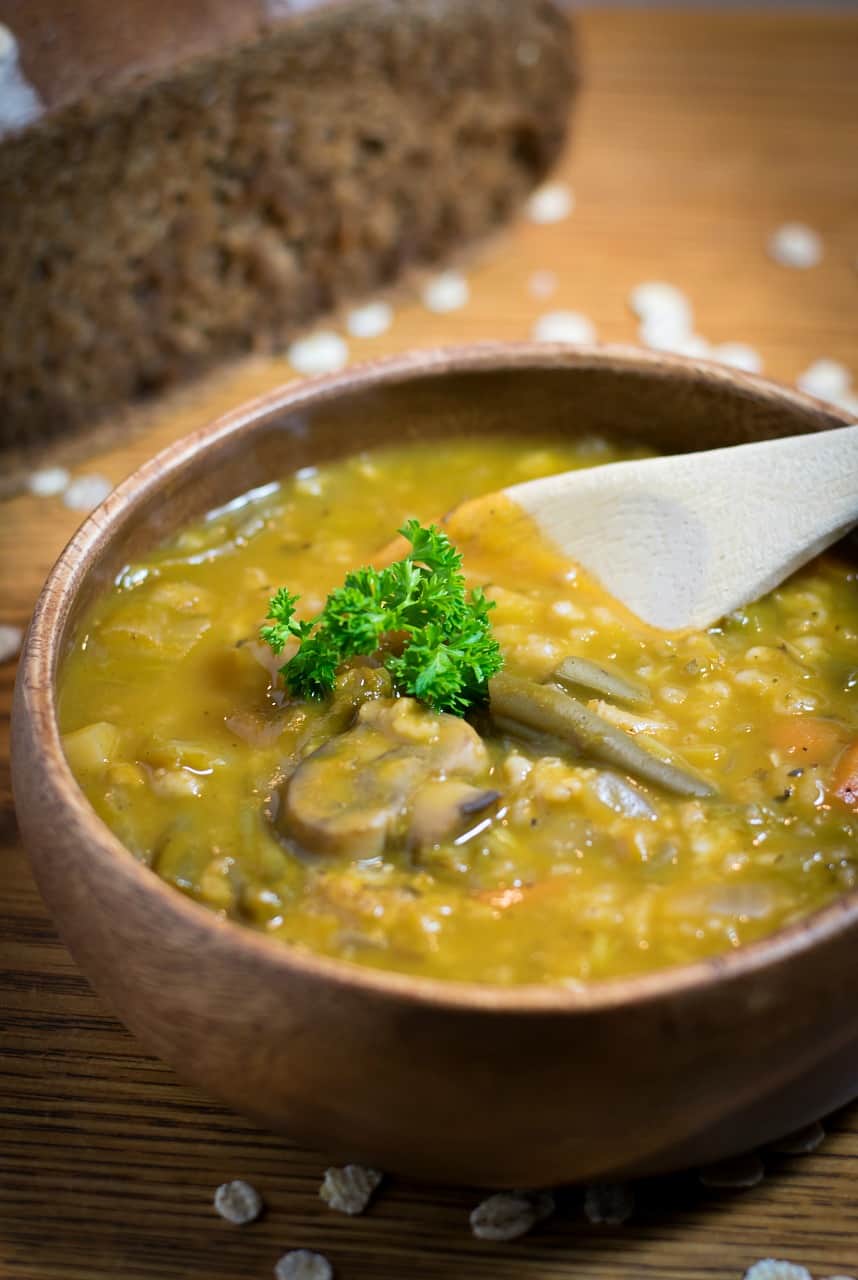
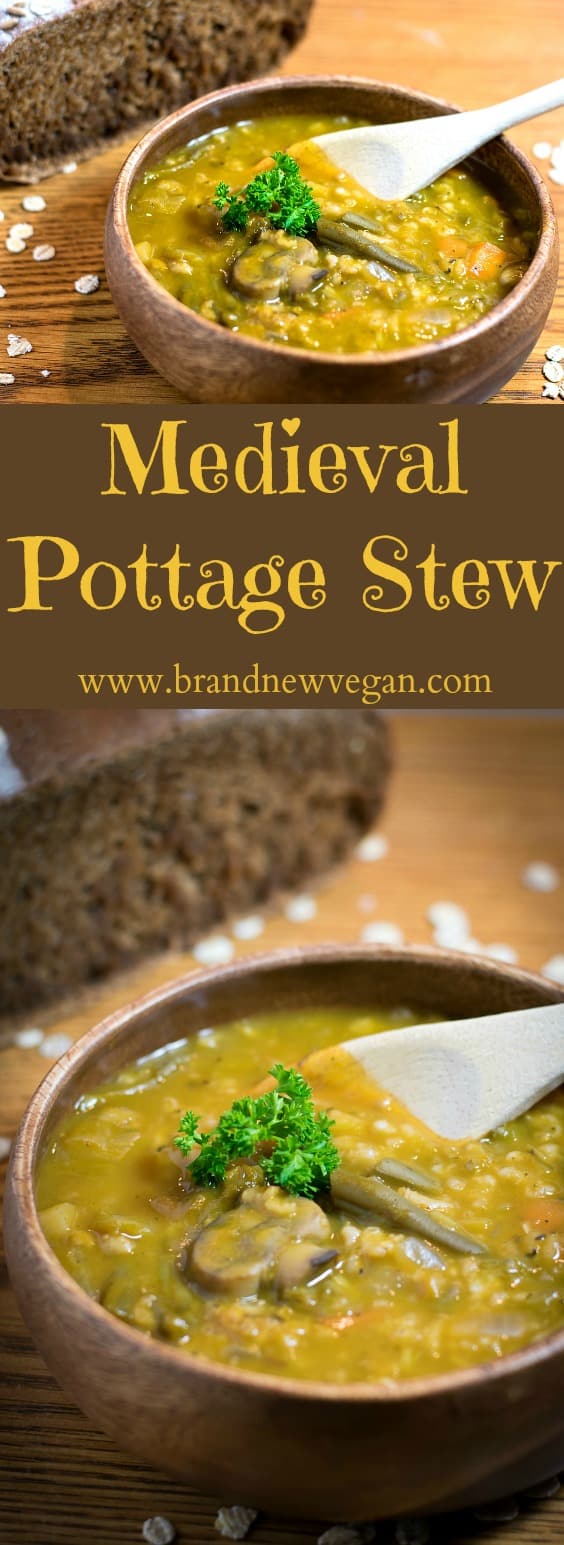

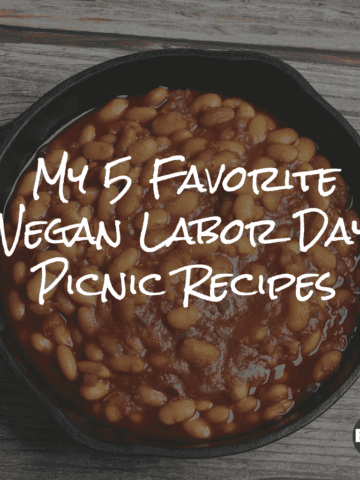

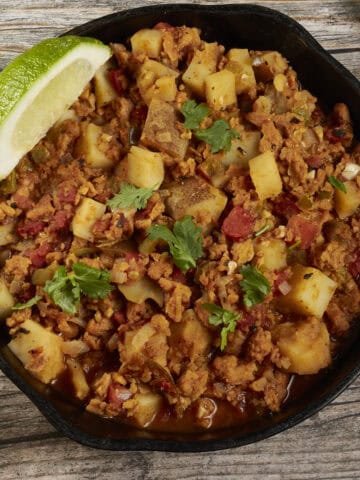
Sarah
I use this recipe to make this soup tonight. And wow. Just delicious. Highly recommended even for those that are not vegan.
Mike Ben Dover
We LOOOOOOVE this idea!!!!! Will totally try for dessert :DD However, we must say that we are not enjoying the fact that this is a stew. We do not like stews. Could you make a non-stew version of this? We would love it! Positive vibes your way. xoxo 😉
Jon G
It seems that vegetarian diets was not just the preserve of those who couldn’t afford much meat. There were differences in diet, based on social standing, but maybe not always along the lines we might imagine. Wheat produces lighter coloured and textured bread than most other grains. Peasants tended to eat more bread from darker grains like rye, the more wealthy could afford wheat and more of the luxuries. But it seems that the bad health associated with mainly protein diets we associate with Henry vIII was not the norm with the earlier Anglo Saxon kings.
There has been some interesting research published recently.
https://www.bbc.co.uk/news/uk-england-cambridgeshire-61178452
Skylar
some salty-arsed carnists in these comments lol. We frequently grew up with soups such as this, and I still make them frequently. Whatever veggies and grains we have lying around, and some vegetable stock. I always just called it "glop" lol. Will try adding wine next time! Nice to have a better name for it. Hahaha
Ron
I made any number of variations of this and love it. I have used turnips, sweet potatoes, pumpkin, brown rice, split peas, wild rice, millet, teff, bulgur, steel cut oats, left over groats, etc. and all are delicious and very healthy.
Angela
Oats were grown in Scotland hence the porridge (but not as we know it and yes they did add salt - oh my blood pressure : ) ) Rye usually in Europe and probably Russia and wheat in England oh and rice in Asia - don't know about anywhere else : ) Potatoes in Ireland?
Ale was drunk by the peasants (as someone said) because everything else was too dangerous.
Your information was interesting but maybe tone it down a little eh? I think the author was trying to do the best he could and the recipe sounds quite interesting for today. I'd like to try it.
Thank you : )
Anne
Good recipe, but I agree with the "historians" on the site. The comments made in the recipe about peasants being better off in terms of diet compared to the rich is not accurate and it shows a kind of disrespect to medieval history to make up facts like that and pass it off as a complete truth to people who are looking to eat healthier. Veggies are definitely healthier for the most part, there's no need to make up medieval history anecdotes to prove it.
Regardless, I love veggie pottage and I thought this recipe was great! I used oats as well and a lentil mix I got from the bargain section. I also added a bit of gravy from another recipe just to add that extra bit of umami to it.
Jeanie
Nice recipe. I often make such a pottage but add whole grains of barley, oats or spelt which I disk in cold water for an hour.
Hubby and I eat mostly veg (he doesn't like meat) so I often steam large amounts of veg and we eat our way through for a couple of days. I fry them up, make a blitz curry or such a pottage - cooking up some red lentils and adding the cooked veg to warm them up.
It's amazing what one can do with vegetables
Lauralee Wiltsie
Believe it or not, I learned a lot of this information by reading, yes you guessed it folks, historical romances. They aren't what they used to be and many of the writers actually do very extensive research. I do check facts. LOL I find it very interesting but really, is it worth arguing about? Opinions are like buttholes. Everyone has one and they're usually full of crap. LOL.
Debra L Steele
Yum, back when food was simple. There were no fake foods. I love veggie stews!
Brandy Cannon
Thank you for this wonderful recipe. I tried it, altering it only to omit the red wine (just not my favorite flavor) and am thrilled with the results. My whole family loved it. Thank you again!
Suzi
The malnourished and therefore disgruntled ghosts of medieval times past have come back to troll the internet in search of anachronistic inerrancies found in 21st century benign and friendly recipe posts. Hilarious albeit pathetic.
The soup was delicious. Thanks for the recipe.
Ruth Crumpton
There's nothing wrong with the recipe per se. It's the making of sweeping statements about medieval diets that various people are commenting on.
Goat
...Who told you this, or have you just got back from Wikipaedo?
That said, it's not a "Medieval Pottage" recipe. Seems it'd have barley rather than our porridge oats we buy, and certainly no red wine, but you're still a cry-baby Matt.
Eileen
How sad that people are so nit-picky. Just enjoy the recipe!!!! It sounds wonderful. Plan on making when I get the ingredients. Always looking for great hearty soups!
Amy
I love this recipe and the history. I wish I could eat a high carb diet like the peasants did, but they were probably super active! With a desk job and and only making it to the gym three times a week, I eat more fat and protein like the rich. Carb diets do not like me! LOL. It looks wonderful! I would love to go outside and work hard just to eat a higher carb diet of grains and starchy vegetables! LOL
Georgia Clayton
Hi there!
I am wondering - could I use this recipe in a crock pot? If so, what would recommend for the amount of time? We're hoping to make this for my medieval history class and a slow cooker version of this would be amazing!
Chuck Underwood
I bet you could - but you'll have to experiment a little on the times.
Tricia
I couldn’t get barley so I used farro. This was only the second time in my life that I’ve had parsnips. Delicious stew. My family likes meat so I made them Viking stew and cheated using potatoes. The Medieval stew is by far my favorite. Thanks for the recipe!
Willow
Just made this and it is DELICIOUS!! I used bulgur instead of barley because I had it on hand, but otherwise stuck to the recipe.
Annie
Boo to the medieval historians and nay sayers on this site. Delicious recipe and according to my Uni in Leeds UK, pottage had veggies she said in it! (Maybe not wine...!) here is a nice research based article. http://www.leeds.ac.uk/youarewhatyouate/news/project%20news%20medieval%20winter.html
Julie
Dear lord, some people get awful feisty about a recipe.
Anyway, I’m just curious if you’ve made this a day before serving and if it holds up well or needs to be served the day of considering the grains? Thx!
Chuck Underwood
You know, I think it would be ok but not totally sure?
Brian
"And who do you think was healthier? The poor scrawny peasants? Or the rich and wealthy lords and kings?"
Lol. The lords and kings. Medieval peasants were notoriously malnourished and lacked sufficient vitamins A, C, and D. Just because there's no meat or dairy in it doesn't mean it's an awesome diet.
Good recipe though.
Petunia
This is not a medieval pottage stew but more like a Modern day stew. If you want to associate it to something more historically accurate, this could be a Victorian era stew that was eaten by the upper and maybe middle classes if you leave out the red wine.
I have to agree with Medieval Matt on the history of pottage. Medieval peasants didn't have a lot to work with - just water and some grains and maybe peas. Anything else they could add to the pottage was a bonus but it was not consistent. They also drank a lot of ale because they mostly had access to grains to make it and they sure as hell did not drink red wine, which is in your recipe. Peasants were the most malnourished in medieval society but everybody in medieval times had a shorter lifespan in general because there was no sanitation systems, absolutely zero understanding of medical science and lack of clean water. For a lot of people, you were lucky if you made it past 40. While the standard american diet is not healthy at all, a strictly high carb diet is not healthy either. Peasants worked all day so they had the carbs to burn the calories but they didn't have other essential nutrients from other sources so they suffered from scurvy and vitamin d deficiency.
So to say that medieval peasants fared better in diet than the rich is wrong BUT in the modern context, if you compared eating standards of poor communities and the upper class in countries such as Guatemala or El Salvador, this assumption is more correct. For upperclass people, fresh foods or street foods were looked down upon negatively because pre-packaged and processed foods are social status items for the well to do folks. Being able to shop in a big grocery store is a social status thing. They wanted to own a piece of industrial progress and show it off. What they don't get is that the poor folks are probably eating better than the rich guy eating a packaged hot dogs and little debbie.
Susan
I live in Finland and even now there are wild foods that can be foraged straight from nature, for instance berries(vitamin c), mushrooms (vitamin d), wild green vegetables such as stinging nettles and countless more(vitamin a, c, potassium, magnesium, folate etc.) fish can be caught and some people still hunt... And before the industrial era... Everyone hunted, everyone fished and everyone foraged. These berries could be made into mead, green and mushrooms dried... So there would be food through winter. How do people think humans survived before farming, for instance?? Not to mention when people started farming. Even up to world War 2, people in Finland farmed their own vegetables and stored them through winter in cold basements. Cabbages were made into sauerkraut. I think people are forgetting how people stored food before the invention of refrigerators.
Leigh
This dish looks delicious. I've gotten very into using rolled oats of late (mixed with ground, raw nuts they make awesome gluten-free croutons, basically just a savory version of granola!) and I love the idea of adding them to soup, so many Americans only thick of using oats in oatmeal...or oatmeal cookies! This sounds like a great way to incorporate this healthful ingredient into other dishes, thanks!
sophie harris
I like your recipe, I'm going to try it, although I'm not sure they would have had mushrooms in the middle ages! They would, however, have added what we call weeds nowadays, like fat hen, chick weed, and hairy bitterness. I like foraging, so I will add some of these to your recipe .
Medieval Matt
Your recipe would be more like frumenty or morrews and would (contrary to you) be made by the wealthy.
Medieval Matt
A medieval peasants pottage was also thin, not thick. The medieval peasants diet consisted of bread, pottage, porridge, and ale. The bread was made from "maslin" because wheat went almost exclusively to market. Maslin was wheat and barley or wheat and rye, it was baked into about a 4lb loaf. Poorer families didn't eat bread because pottage didn't require flour. Flour was milled exclusively by the lord of the manor, as was all the baking. The baker baked all bread in the village so that all the fees would go to the lord. If you are going to pass of something as historical you should do a little research.
Pandorash
I highly recommend watching the “Tudor Monastery” series on the YouTube channel ‘Absolute History’. It’s set just after the dark ages and it’s a more affluent farming lifestyle as opposed to those who were truly poor, but it references hardship and shows a very accurate account of what life was like in England around 1500. They did not live a vegan lifestyle, but vegetables and grain where certainly the main feature. I think there’s nothing wrong with a modern take on old recipes, but we do have to be careful when speaking into historical facts. Personally though, I bet if we were to transport an everyday person from any time period they would simply walk into a supermarket and buy the best food they could afford. We really haven’t changed much, just what’s available around us. When researching history though, it makes me thankful for things we take for granted now. But I look forward to trying this recipe! Thank you xx
Medieval Matt
I can tell you're not a historian. First of all, medieval peasants suffered greatly from a lack of lipids, protein, and vitamins A, C, and D. The idea that medieval peasants were healthier and lived longer than nobles is complete and utter bull. Peasants were lucky to live into their 50's.They would have given their eyeteeth to be able to throw a piece of salt pork or bacon into the pot with their pottage.
Pottage itself consisted of sprouted barley grains that were thrown into a pot of water. They could either make pottage out of this or they could pour of the water and drink it sweetened with honey, or they could ferment it into beer. Peas and beans were added and any vegetable or greens at hand would be added to the pot, including things like nuts, fruit ( fruit would be cooked because they thought they were bad for you raw) strawberry and primrose greens. Winter was when pottage was mostly peas and barley.
If you lived on a medieval peasants diet you would be very unhealthy. Stop spreading lies to support you worldview.
Chuck Underwood
What a thoughtful comment.....thank you so much. And I suppose you know all this because.....you ARE a historian? Can I see any papers you've published? I'd love to read them. I agree, life in the middle ages was hard, and yes - many people died from disease and malnutrition....... But the point is....their mainly vegetarian diet, using whole unprocessed foods, with little to no salt, sugar, or meat was indeed WAY healthier than the garbage we eat today called the Standard American Diet.
Mister Fister
"unprocessed" yes because food in medieval times was processed LOL.
Si
Cooking is a process as is pickling, fermenting, smoking, drying.
jim
LOL,no kidding. the recipe sounds pretty good. im not vegiatrian or vegan but i appreciate good food. ill be making this soon. as far as bug up my ass Matt, every party has one.
Justin
Mike sounds like an asshole
PJinPA
I'm making a light medieval-themed supper for a group tomorrow night, and this pottage as well as a Medieval barley bread from another site (It has ale and honey in it too).
As far as the pottage goes, once I had the turnips, parsnips, carrots, and onions and veg broth cooking, it smelled so awful that I decided to do some tweaking. My changes to the original recipe are: no green beans but a handful of dried chickpeas, I couldn't find oatmeal in the pantry so used 1 c of barley, I bought only 1 qt of vegetable stock but was simultaneously making chicken stock so I put in a quart of that (I feel a bit guilty about wrecking the vegan-ness of the recipe, but I suspect our medieval friends would have been happy to throw a partridge or other bird in if they had caught one), and about 1/2 c mashed butternut squash for a tad of sweetness. I thought about half a can of beer rather than red wine; it probably would have been more accurate (less inaccurate) but the wine was handy. Oh yeah, I also added about 3 cloves of minced garlic - can't cook without it!. And I have some fresh spinach that I might tear up and put in at the very end. I don't want to rate the recipe yet because it isn't finished, but I don't know if I can post the comment without a rating :/
I also have several bottles of mead from a local winery, and some blackberry wine too - no idea of the blackberry is at all authentic to the time, but it's so good! I'll get a few jugs of cider.
What about butter for the bread? Or maybe just some honey? or honey-butter?
NebEngProf
Nice!!!! Except the mead. . . I overdid that by SOOOO much at a medieval banquet in Ireland a long time ago. The next morning I didn’t have my traveler’s checks (that’s how long ago!), cash, nor my passport! Wicked hangover too...
Ernest
Also, let's not forget that most people would keep a pig that would be slaughtered just before winter. From here it would be hung over the fire place to smoke. The meats and fats would be used extensively to see you through the winter months. Blood, intestines, brains and skin would be used to keep you alive. Vegitables do not grow in the winter in Europe. So to try and state that a peasants diet was vegitarian is so utterly wrong as to be insulting. Cats, dogs and rats were routinely eaten, and there is so much historical evidance to back this up that your assumption is just laughable. There was no understanding of calories, ethical farming or woke snowflakes. There was just hunger and death.
And pray tell me, where in the bleakest parts of the North of England does one find red wine or balsamic vinegar? This is a time where milk was not drunk by adults, water could kill you and ale was as drunk by everyone, Three quaters of the population were under 30 and infant mortally was so high that nine or ten children were the norm to ensure at least some made it to adulthood. Oh, and a womans chance of dying in childbirth was one in ten...
Sure your recipe sound OK, but calling it Medieval Pottage Stew is as insulting as calling McDonalds a Michelin started restaurant
Scientist and historian from Iowa
Holy panties in a bunch much? So who cares if this recipe isn’t a 100% replicated by medieval recipe standards. I doubt anyone cares to eat the original type of pottage, while we have so many options (vegan, vegetarian and carnivorous included).
Medieval diet greatly varied by the regions, climates and cultures. The peasants just didn’t have the luxury to eat excessively and freely to whatever their hearts desired. Balanced diet equaled better health, although their strenuous physical life could not hold up to let them live into old age.
Jo
Yes in UK we have winter vegetables. And were able to store many vegetables over winter. Turnips, swede, sprouting etc. So your comment is incorrect.
Rick Bear
Good points, Matt. My mother was a Medieval historian and you're exactly correct.
I was also worried about Sue's thinking about "low sodium". I hope you're not recommending Low Sodium Salt, Sue? Reason being that Low Sodium Salt is extremely bad for the heart. I think the message of not mixing fun experiments in Medieval cooking with trendy vegan philosophy is well made. We all need to be careful and not get carried away.
As for your recipe, Sue. Yes, it sounds good, although I'm not sure whether Peanuts were available at the time (perhaps you might advise?). I'll certainly be having a go at my own version of Pottage and will take Sue's suggestions as a starting point.
Thank you Matt and Sue for your suggestions.
Rick
Barbie Lee
Im asian anD i love eating DIFFRENT KINDS of easy to cook vegetable soup like this. ? will try this
panthergrrl
This sounds delicious. I love the idea of taking cups of veggies you already have and combining them with spices and a bit of grains. Will definitely try this.
Sue Resig
I have some whole oats that I bet would work great for this. I'll put them in sooner to give them time to soften. Tell me, I signed up to be a patron on Protheon, how do I get to see the page without the ads now?
Chuck Underwood
Hi Sue! I just sent you an invite to my private Facebook Page. Be sure and check your spam folder. Oh, and I know EXACTLY what The Gerson Therapy is. Hope you have the best of luck with that. Everything I post n my Patreon page is Ad Free...so it's just another way of getting the recipe, only without the ads.
Chuck Underwood
You'll also see the same recipe posted in our FB Group.
Adrienne
Can you use quick oats for this or no?
Reill Knull
Yumm, looks delicious! I never tried adding oats to soup before, I will have to give this one a go